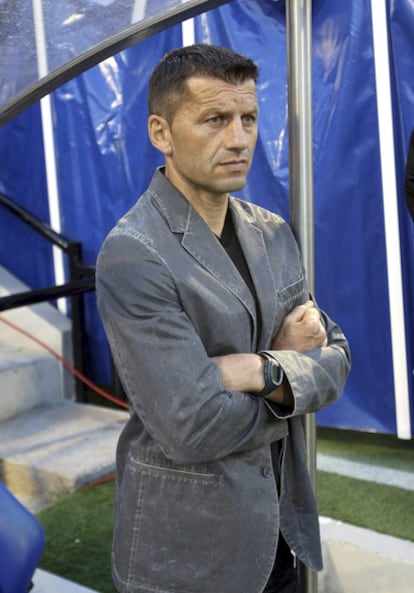A multi-million misadventure
Hércules' financial plight could augur double-relegation to third division
Relegated Hércules' season in Primera División has been an expensive adventure. Despite operating on a top-flight budget of 42 million euros, four times that of Valencia rival Levante, which has already ensured its own survival, its sporting and social infrastructure was never up to scratch. The Alicante-based club has been hurled headlong into a spiral of degradation that has pushed it to the brink of the abyss.
Between last season and this Hércules has accumulated a debt of almost35 million euros and if its board of directors cannot come up with at least 14 million euros before August, it could face administrative relegation to Segunda B.
The club's major shareholder, Enrique Ortiz, is embroiled in an investigation over the awarding of garbage collection contracts in the province, through which taped conversations featuring Ortiz, club captain Tote and vice captain Abraham Paz discussing bribes to fix the results of four Segunda División matches last season were obtained. The Spanish Football Federation and the courts have since laid the matter to rest, partly because Ortiz's contract wrangling forms part of the wider Gürtel investigation into political corruption, and partly because match-fixing only became a criminal offense last December.
While the scandal was unfolding, however, Hércules went about strengthening its squad for a season in the top flight. David Trezeguet was bought from Juventus and Paraguay's World Cup star Nelson Valdez lured from Borussia Dortmund, while Royston Drenthe was loaned to the club by Real Madrid. These three international players contributed to a wonderful start to life in the Primera - Valdez scored twice in a famous victory at Camp Nou in the second game of the season - that saw Hércules sitting comfortably in mid-table with half the season played.
That win, though, was Hércules' only triumph away from its Rico Pérez stadium and off-field incidents began to overshadow the side's occasionally scintillating play. A strike threat ensued before Real Madrid was due to visit Alicante because there was no hot water at Hercules' single training field. Drenthe, Hércules' best player in the early stages of the season, launched a one-man protest over unpaid wages, returning late from a Christmas vacation in the Netherlands and being frozen out of the team.
With nine matches of the season remaining, the team was bottom of the table, and coach Esteban Vigo duly dismissed. His replacement, Miroslav Djukic, was far from impressed by his inherited players, who he found to be little enthused by the notion of hard work. "The team is physically sunk," he said. "They cannot last 90 minutes at a high tempo. They fall over and ask to be substituted."
As is common in modern soccer, a real estate promoter and contractor who thought he knew more than anybody had planned the future of the club without a youth set-up while seeking investment from developments around the Rico Pérez to fund the construction of a new stadium. But a check-book policy of signing expensive players has led Hércules to the cusp of oblivion. Ortiz has largely washed his hands, leaving 80 percent of the club's shares in the control of the Hércules Foundation. Miguel Campoy, a Popular Party congressman and chief of the Alicante Ports Authority, took the reins and set up a sponsorship deal with the Valencia regional government that allowed the players' wages to be paid.
Hércules may be saved in the short-term by the 7 million eurosit will receive from the league for its relegation and the possible sale of Valdez. But Hércules has followed Ortiz on the path Valencia took under Juan Soler, of pharaonic projects that never saw the light of day. Now, dark dayslay ahead. "Our expectations were different," noted Valdez. "It has been a complete failure."

Tu suscripción se está usando en otro dispositivo
¿Quieres añadir otro usuario a tu suscripción?
Si continúas leyendo en este dispositivo, no se podrá leer en el otro.
FlechaTu suscripción se está usando en otro dispositivo y solo puedes acceder a EL PAÍS desde un dispositivo a la vez.
Si quieres compartir tu cuenta, cambia tu suscripción a la modalidad Premium, así podrás añadir otro usuario. Cada uno accederá con su propia cuenta de email, lo que os permitirá personalizar vuestra experiencia en EL PAÍS.
¿Tienes una suscripción de empresa? Accede aquí para contratar más cuentas.
En el caso de no saber quién está usando tu cuenta, te recomendamos cambiar tu contraseña aquí.
Si decides continuar compartiendo tu cuenta, este mensaje se mostrará en tu dispositivo y en el de la otra persona que está usando tu cuenta de forma indefinida, afectando a tu experiencia de lectura. Puedes consultar aquí los términos y condiciones de la suscripción digital.








































